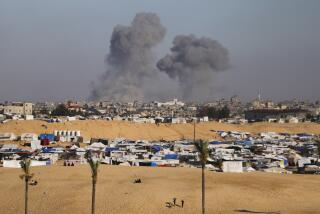McManus: Obama plays for time to avoid ‘red line’
- Share via
Barack Obama really, really does not want to get tangled up in Syria.
For almost a year, Obama’s secretaries of State — first Hillary Rodham Clinton, now John Kerry — have pressed the president for more aid to the insurgents who are fighting to overthrow Syrian President Bashar Assad.
Obama and his White House aides have resisted, fearing a slippery slope that would lead inexorably to U.S. military intervention and the kind of messy Middle Eastern war he campaigned against in 2008.
But Obama has also insisted there is a “red line” that the Syrian regime must not cross: chemical weapons. If Assad used nerve gas or other chemical agents, the president said bluntly last year, that would be “a game-changer.”
We are about to find out if the president meant what he said.
It appears certain that Assad’s forces have used nerve gas on his opponents. The information comes from several sources, and the Israelis, the British, the French and the Democratic head of the Senate Intelligence Committee, Sen. Dianne Feinstein (D-Calif.) all think the red line has been crossed.
But Obama has reacted by blurring the line he drew. The test, he said last week, is whether Syria has engaged in “the systematic use of chemical weapons,” not just one or two incidents that might be accidental.
And even if that line has been crossed, it is not clear what the United States will do.
“By game-changer,” he said Tuesday, “I mean that we would have to rethink the range of options that are available to us.”
In the face of such vague warnings, it’s no wonder that Assad, who is in a fight for his life, decided to test the red line’s limits. His forces used chemical weapons in small amounts in two or three places — just enough to terrorize his enemies, deter fence-sitters from joining the rebel camp and see how Obama would react.
So far, the president is playing for time. But pressure is building on him to act more forcefully — exactly the outcome he hoped to avoid.
“It’s not just about Syria,” one official noted. “Iran is watching to see what happens to a regime that crosses one of our red lines. North Korea is watching. Everybody’s watching.”
Even before the chemical weapons issue surfaced last week, pressure for more action was mounting from both parties in Congress. The Democratic chairman of the Senate Foreign Relations Committee has urged Obama to provide weapons to the rebels; the chairman of the Armed Services Committee has proposed setting up a U.S.-protected “safe zone” on Syria’s northern border, a step that would require U.S. military action in the form of airstrikes and antiaircraft missiles. The president has rejected both ideas so far.
Obama has bought time by citing George W. Bush’s unhappy experience with evidence of weapons of mass destruction in Iraq. This time, he insists, we have to be certain, so he’s demanding that Syria allow United Nations arms inspectors into the country to look for evidence of chemical weapons. He’s also asking Russia, Syria’s most powerful ally, to lean on Assad to cut it out.
Assad, if he’s smart, will stop using nerve gas on the battlefield, at least for a while. But the rebels are mounting increasingly effective attacks in Syria’s capital, Damascus, and if Assad’s regime fears it could lose the capital city, the chemical weapons may come out again.
In his news conference Tuesday, Obama acknowledged that staying out of the conflict was not an available option. “We are already deeply invested in trying to find a solution here,” he said. “We already are deeply engaged,” he added, referring to the nonlethal aid, training and intelligence the United States has been supplying to rebel groups.
Indeed, the United States is already providing nonlethal military supplies, training and intelligence to moderate factions among the rebels, plus millions of dollars in humanitarian aid to Syrian refugees.
The administration’s hope is that, over time, the Assad government will weaken, the moderate rebels will become stronger and the radical Islamist rebels of the Nusra Front will diminish. That would allow Obama to keep direct U.S. military intervention to a minimum and to avoid putting U.S. troops on the ground, unless they’re needed to secure Syria’s chemical weapons stocks.
He has public opinion on his side. A CBS News/New York Times poll released Tuesday found that 62% of Americans think the United States bears no responsibility for getting involved in the Syrian war.
The president tends to agree with that, and he still hopes to avoid getting more deeply tangled in Syria. But a civil war in a country with chemical weapons and three important U.S. allies on its borders can’t be wished away.
Follow Doyle McManus on Twitter @DoyleMcManus
More to Read
A cure for the common opinion
Get thought-provoking perspectives with our weekly newsletter.
You may occasionally receive promotional content from the Los Angeles Times.











